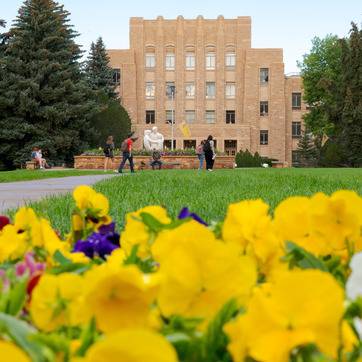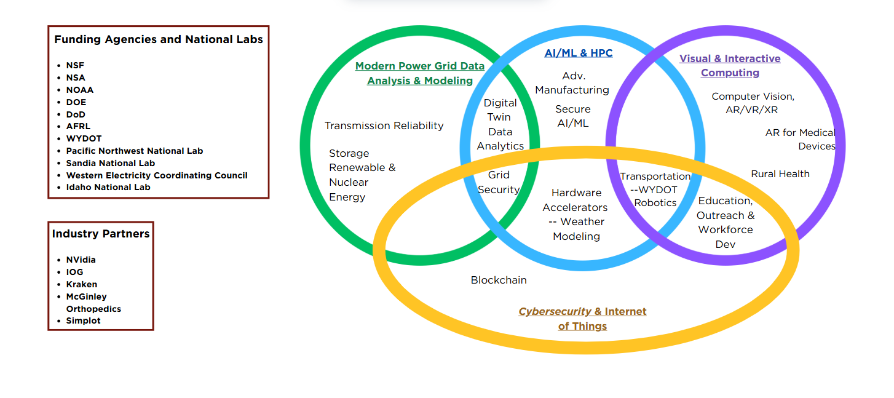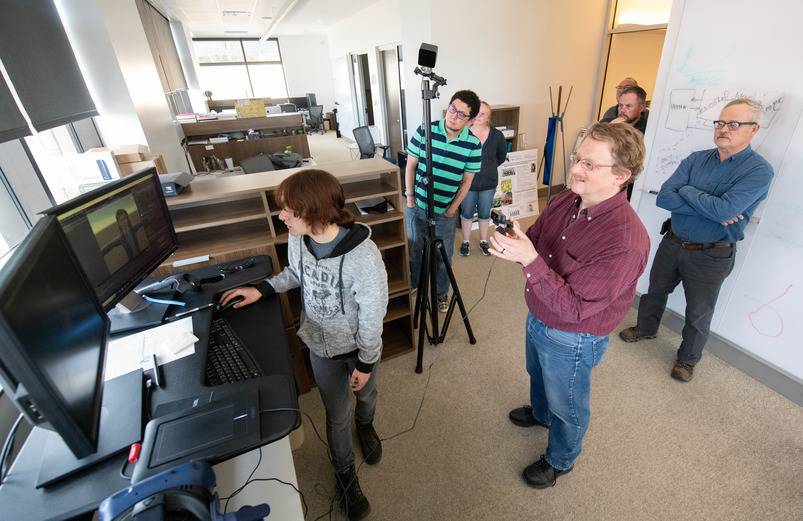
My research focuses broadly on biometrics and digital forensics. I am interested in AI and its applications to improve robustness and reliability of systems that use sensitive data and analyze its implications on security, privacy and fairness.
Dr. Duan’s research group is interested in statistical signal processing and its applications in cyber-physical systems, such as power systems, intelligent transportation systems, and wireless communication networks. Selected topics are: power system state estimation, power system small-signal stability analysis, power system transient stability analysis, and power system cyber-attack defense (power systems); sensing for autonomous vehicles, localization and mobility tracking in intelligent transportation systems, behavior analysis for autonomous driving (intelligent transportation); cognitive radio, wireless sensor networks, and cooperative communications (wireless communication networks).
Investigation of noise processes in RF and microwave oscillators, amplifiers, and other devices. Generation and synthesis of RF signals that are very stable in frequency and amplitude.
Dr. Gamboa’s research interests lie in the formalization of mathematics. For his dissertation work, he modified the theorem prover ACL2 to support irrational numbers and formalized basic theorems from trigonometry and calculus. Since joining the University of Wyoming, he has formalized many more theorems in ACL2, including the Fundamental Theorem of Algebra, Stirling’s Approximation, and the Banach-Tarski Paradox.
My research focuses on developing signal processing techniques to enhance the security, reliability, and resilience of energy systems and other critical infrastructures. I work on smart grids with modern sensing technologies, addressing challenges such as situational awareness under uncertainty, risk-aware decision-making, and multi-resolution sensor data analytics. I also explore heterogeneous data analysis across smart city components and power system cybersecurity.
John Hitchcock’s research is in theoretical computer science, with a focus on computational complexity theory. He studies the structural properties of complexity classes using techniques from resource-bounded measure and dimension, algorithmic randomness, and Kolmogorov complexity. His work aims to clarify what computers can and cannot accomplish efficiently.
Our lab focuses on the study of quantum information theory and its application in different useful areas, such as quantum cryptography and quantum networks. More specifically, we study entropic uncertainty relations, the behavior of high-dimensional quantum states in different channels as well as non-local phenomena such as entanglement and discord.
Dr. Chao Jiang's research interests include autonomous robots, human-robot interaction, multiple and distributed systems, healthcare robotics, robotic learning, and stochastic optimal control. His research is dedicated to advancing the fundamental understanding of intelligent behaviors in autonomous systems across a wide range of tasks and dynamic environments. His work focuses on developing intelligent and autonomous systems through the integration of control theory, machine learning, and stochastic optimization.
Dr. Vinit Katariya’s research lies at the intersection of intelligent transportation systems, smart cities, embedded AI, and computer vision. His work focuses on real-time trajectory forecasting, monocular depth and speed estimation, motion generation, anomaly detection, and privacy-preserving behavior modeling in both urban and indoor environments. He develops scalable AI pipelines for edge-IoT devices and creates benchmark datasets that support socially-aware, infrastructure-responsive systems. Dr. Katariya also explores the use of WiFi Channel State Information (CSI) for human sensing, leveraging transformer-based models to enable privacy-preserving segmentation and behavior understanding. He is deeply committed to designing real-time, privacy-aware AI systems that promote public safety, security, and societal well-being.
Lars' research focuses on enabling researchers and practitioners to use state-of-the-art Artificial Intelligence and Machine Learning. Through meta-algorithmic techniques that automatically customize a general approach for the given problem, it becomes possible to use AI easier and get better performance. Lars also investigates the application of AI and ML in other areas, in particular materials science.
Dr. Majeed’s research sits at the intersection of fundamental and applied sciences, with a strong emphasis on developing advanced systems in artificial intelligence, computer vision, sensing, automation, and robotics. His work aims to enhance the sustainability, efficiency, and resilience of agricultural production across both controlled environment agriculture (CEA) and open-field systems. By integrating cutting-edge technologies with domain-specific challenges, Dr. Majeed’s interdisciplinary approach translates theoretical advancements into practical solutions. His contributions are helping shape the future of precision and climate-smart agriculture, driving innovation toward more intelligent and sustainable food systems.
I am working in three applications of computer vision. First, in Controlled Environment Agriculture. Second, in Technology and Computing for Wildlife Applications. Third, pose estimation methods which guarantee that all the depths are positive.
Prof. Muknahallipatna's research interests are in Edge Artificial Intelligence, High-Performance Computing (HPC), and Quantum Computing. Edge Artificial Intelligence research is primarily focused on the transportation sector; HPC research involves refactoring weather model codes, such as MPAS and FV3, to execute on heterogeneous architectures. The research in Quantum Computing is primarily focused on algorithms and quantum education.
John O’Brien’s research is in the area of robotics and applied high performance automatic control. He has investigated auto-synthesis techniques using novel system identification and artificial intelligence. He has experience as a researcher at NASA’s Jet Propulsion Laboratory and was a senior lead engineer at General Dynamics Advanced Information Systems.
The primary goal of my lab is to investigate charge carrier dynamics in various semiconductor materials to help build better electronic and optoelectronic devices. We use optical excitation to look at charge carrier generation, recombination, and transport, as well as charge transfer across material interfaces. Frequently these materials are nanostructured materials such as quantum dots or nanowires or even combinations of these, where we study how charge moves among the different material layers. To conduct these studies, we have an ultrafast pulsed laser system consisting of a regenerative amplifier and optical parametric amplifier which allows us to excite the material with 100fs pulses at any wavelength we choose. With this system we conduct Transient Absorption (TA) spectroscopy with an optical delay line and white light probe and THz spectroscopy measurements. In addition, we have a Time Correlated Single Photon Counting setup which we use to conduct Time Resolved Photoluminescence (TRPL) measurements. In the past we have studied everything from quantum dots for semiconductor laser active regions to nanomaterials for new solar cell materials. We are currently conducting experiments on photocatalysts materials.
Dr. Sheshappanavar’s research focuses on advancing computer vision, deep learning, and vision-language models (VLMs) to enable robust scene understanding and assistive technologies. His work integrates different 2D and 3D representations such as images, depth maps, thermal maps, point clouds, meshes, neural radiance fields (NeRFs) and 3D Gaussian Splatting for real-time object recognition, robotic navigation, and accessibility solutions. By developing multimodal datasets and privacy-preserving AI systems, he aims to bridge the gap between foundational research and impactful, human-centered applications. The applications include assisting people with visual impairment, in Controlled-Environment Agriculture, and Digital Humanities.
Dr. Shukla's group, the Secure Sensing and Learning (SSL) Research Lab, focuses on machine learning and cybersecurity, with a specific interest in designing secure and trustworthy models for computing systems. The group's research spans applications of these areas to automated reasoning, wearable devices, attack-averse authentication, biometrics, and the formulation and mitigation of side-channel attacks.
His research interest lies in systems security, software engineering, and performance optimization in blockchains and other emerging distributed/decentralized systems. His research tackles automatic design-flaw discovery via fuzzing, denial of service security, cost optimization, and network measurement, all in permissionless blockchains, like Ethereum.
Professor Walker's research centers on robotics, particularly novel continuous backbone "continuum" and soft robots. His group conducts basic research in the design, modeling, and application of biologically inspired "tongue, trunk, and tentacle" robots. A further focus of Professor Walker's research is on Architectural Robotics, the use of robotics to create novel (physical) spaces.
Dr. Zejian Zhou focuses on designing autonomous systems, with a commitment to bridging the gap between artificial intelligence and the autonomous control of real-world physical systems. His research interests also include reinforcement learning, optimal control, multi-agent systems, game theory, and robotics.



